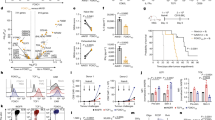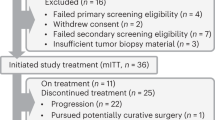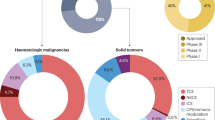Abstract
Donor lymphocyte infusions (DLIs) after allo-SCT displayed limited use in CLL and highly malignant non-Hodgkin's lymphoma (NHL). Here we studied whether Bi20 (FBTA05), a novel trifunctional bispecific antibody targeting CD20 on lymphoma cells and CD3 on T cells, could induce GVL responses in combination with DLI or mobilized PBSCT after allogeneic transplantation in these diseases. Six patients (three cases with p53-mutated CLL and three with high-grade NHL (HG-NHL)) refractory to standard therapy were treated with escalating doses of Bi20 (range 10–2000 μg) followed by DLI or SCT. Thereby, all CLL patients showed a prompt but transient clinical and hematological response. In one patient with HG-NHL, we observed a halt in progression for almost 4 months. Side effects (fever, chills and bone pain) were tolerable and appeared at antibody dose levels between 40 and 200 μg. The cytokine profile was characterized by transient increases of IL-6, IL-8 and IL-10. Neither human anti-mouse antibodies nor GVHD developed, allowing repeated treatment courses. In summary, the trifunctional antibody Bi20 induced prompt antitumor responses in extensively pretreated, p53-mutated alemtuzumab and rituximab refractory patients indicating its therapeutic potential.
This is a preview of subscription content, access via your institution
Access options
Subscribe to this journal
Receive 12 print issues and online access
$259.00 per year
only $21.58 per issue
Buy this article
- Purchase on Springer Link
- Instant access to full article PDF
Prices may be subject to local taxes which are calculated during checkout









Similar content being viewed by others
References
Grigg A, Ritchie D . Graft-versus-lymphoma effects: clinical review, policy proposals, and immunobiology. Biol Blood Marrow Transplant 2004; 10: 579–590.
Butcher BW, Collins Jr RH . The graft-versus-lymphoma effect: clinical review and future opportunities. Bone Marrow Transplant 2005; 36: 1–17.
Khouri IF, Keating M, Korbling M, Przepiorka D, Anderlini P, O’Brien S et al. Transplant-lite: induction of graft-versus-malignancy using fludarabine-based nonablative chemotherapy and allogeneic blood progenitor-cell transplantation as treatment for lymphoid malignancies. J Clin Oncol 1998; 16: 2817–2824.
van Besien KW, de Lima M, Giralt SA, Moore Jr DF, Khouri IF, Rondon G et al. Management of lymphoma recurrence after allogeneic transplantation: the relevance of graft-versus-lymphoma effect. Bone Marrow Transplant 1997; 19: 977–982.
Bierman PJ, Sweetenham JW, Loberiza Jr FR, Taghipour G, Lazarus HM, Rizzo JD et al. Syngeneic hematopoietic stem-cell transplantation for non-Hodgkin’s lymphoma: a comparison with allogeneic and autologous transplantation—The Lymphoma Working Committee of the International Bone Marrow Transplant Registry and the European Group for Blood and Marrow Transplantation. J Clin Oncol 2003; 21: 3744–3753.
Marks DI, Lush R, Cavenagh J, Milligan DW, Schey S, Parker A et al. The toxicity and efficacy of donor lymphocyte infusions given after reduced-intensity conditioning allogeneic stem cell transplantation. Blood 2002; 100: 3108–3114.
Kawano I, Tsukada J, Toda Y, Ogawa R, Higashi T, Iwashige A et al. [Remission induction of refractory diffuse large B-cell lymphoma with allogeneic peripheral blood stem cell transplantation followed by interferon-alpha and donor lymphocyte infusion]. Rinsho Ketsueki 2004; 45: 155–160.
Porter DL, Levine BL, Bunin N, Stadtmauer EA, Luger SM, Goldstein S et al. A phase 1 trial of donor lymphocyte infusions expanded and activated ex vivo via CD3/CD28 costimulation. Blood 2006; 107: 1325–1331.
Ritgen M, Stilgenbauer S, von Neuhoff N, Humpe A, Bruggemann M, Pott C et al. Graft-versus-leukemia activity may overcome therapeutic resistance of chronic lymphocytic leukemia with unmutated immunoglobulin variable heavy-chain gene status: implications of minimal residual disease measurement with quantitative PCR. Blood 2004; 104: 2600–2602.
Cartron G, Watier H, Golay J, Solal-Celigny P . From the bench to the bedside: ways to improve rituximab efficacy. Blood 2004; 104: 2635–2642.
Segal DM, Weiner GJ, Weiner LM . Bispecific antibodies in cancer therapy. Curr Opin Immunol 1999; 11: 558–562.
Kufer P, Lutterbuse R, Baeuerle PA . A revival of bispecific antibodies. Trends Biotechnol 2004; 22: 238–244.
Ruf P, Lindhofer H . Induction of a long-lasting antitumor immunity by a trifunctional bispecific antibody. Blood 2001; 98: 2526–2534.
Stanglmaier S, Faltin M, Ruf P, Bodenhausen A, Schröder P, Lindhofer H . Bi20 (FBTA05) a novel trifunctional bispecific antibody (anti-CD20 × anti-CD3), mediates efficient killing of lymphoma B cells even with very low CD20 expression levels. Int J Cancer 2008; 123: 1181–1189.
Cheson BD, Bennett JM, Grever M, Kay N, Keating MJ, O’Brien S et al. National Cancer Institute-sponsored Working Group guidelines for chronic lymphocytic leukemia: revised guidelines for diagnosis and treatment. Blood 1996; 87: 4990–4997.
Cheson BD, Horning SJ, Coiffier B, Shipp MA, Fisher RI, Connors JM et al. Report of an international workshop to standardize response criteria for non-Hodgkin’s lymphomas. NCI Sponsored International Working Group. J Clin Oncol 1999; 17: 1244.
Coiffier B . Rituximab therapy in malignant lymphoma. Oncogene 2007; 26: 3603–3613.
Friedberg JW . Unique toxicities and resistance mechanisms associated with monoclonal antibody therapy. Hematology Am Soc Hematol Educ Program 2005, 329–334.
Bonavida B . Rituximab-induced inhibition of antiapoptotic cell survival pathways: implications in chemo/immunoresistance, rituximab unresponsiveness, prognostic and novel therapeutic interventions. Oncogene 2007; 26: 3629–3636.
Jazirehi AR, Vega MI, Bonavida B . Development of rituximab-resistant lymphoma clones with altered cell signaling and cross-resistance to chemotherapy. Cancer Res 2007; 67: 1270–1281.
Ghielmini M, Rufibach K, Salles G, Leoncini-Franscini L, Leger-Falandry C, Cogliatti S et al. Single agent rituximab in patients with follicular or mantle cell lymphoma: clinical and biological factors that are predictive of response and event-free survival as well as the effect of rituximab on the immune system: a study of the Swiss Group for Clinical Cancer Research (SAKK). Ann Oncol 2005; 16: 1675–1682.
Brandl M, Grosse-Hovest L, Holler E, Kolb HJ, Jung G . Bispecific antibody fragments with CD20 × CD28 specificity allow effective autologous and allogeneic T-cell activation against malignant cells in peripheral blood and bone marrow cultures from patients with B-cell lineage leukemia and lymphoma. Exp Hematol 1999; 27: 1264–1270.
Zeidler R, Mysliwietz J, Csanady M, Walz A, Ziegler I, Schmitt B et al. The Fc-region of a new class of intact bispecific antibody mediates activation of accessory cells and NK cells and induces direct phagocytosis of tumour cells. Br J Cancer 2000; 83: 261–266.
Heiss MM, Strohlein MA, Jager M, Kimmig R, Burges A, Schoberth A et al. Immunotherapy of malignant ascites with trifunctional antibodies. Int J Cancer 2005; 117: 435–443.
Morecki S, Lindhofer H, Yacovlev E, Gelfand Y, Slavin S . Use of trifunctional bispecific antibodies to prevent graft-versus-host disease induced by allogeneic lymphocytes. Blood 2006; 107: 1564–1569.
Ferrara JL, Cooke KR, Pan L, Krenger W . The immunopathophysiology of acute graft-versus-host-disease. Stem Cells 1996; 14: 473–489.
Nikolic B, Lee S, Bronson RT, Grusby MJ, Sykes M . Th1 and Th2 mediate acute graft-versus-host disease, each with distinct end-organ targets. J Clin Invest 2000; 105: 1289–1298.
Ruf P, Jager M, Ellwart J, Wosch S, Kusterer E, Lindhofer H . Two new trifunctional antibodies for the therapy of human malignant melanoma. Int J Cancer 2004; 108: 725–732.
Sebastian M, Passlick B, Friccius-Quecke H, Jager M, Lindhofer H, Kanniess F et al. Treatment of non-small cell lung cancer patients with the trifunctional monoclonal antibody catumaxomab (anti-EpCAM × anti-CD3): a phase I study. Cancer Immunol Immunother 2007; 56: 1637–1644.
Burges A, Wimberger P, Kumper C, Gorbounova V, Sommer H, Schmalfeldt B et al. Effective relief of malignant ascites in patients with advanced ovarian cancer by a trifunctional anti-EpCAM × anti-CD3 antibody: a phase I/II study. Clin Cancer Res 2007; 13: 3899–3905.
Kiewe P, Hasmuller S, Kahlert S, Heinrigs M, Rack B, Marme A et al. Phase I trial of the trifunctional anti-HER2 × anti-CD3 antibody ertumaxomab in metastatic breast cancer. Clin Cancer Res 2006; 12: 3085–3091.
Stemmler HJ, Salat C, Lindhofer H, Menzel H, Untch M, Kahlert S et al. Combined treatment of metastatic breast cancer (MBC) by high-dose chemotherapy (HDCT) and bispecific antibodies: a pilot study. Anticancer Res 2005; 25: 3047–3054.
Acknowledgements
This study is supported by grants of the Deutsche José Carreras Leukämie-Stiftung eV (DJCLS R 06/23) to Raymund Buhmann and Hans-Jochem Kolb; B Simoes is supported by grant 01/04492-8 FAPESP (Fundacao de Amparo a Pesquisa do Estado de Sao Paulo), Brasil; T Yang is supported by a fellowship of the German Academic Exchange Service (DAAD). We are indebted to many nurses and physicians for unconditional assistance in patient care, referral of patient material and data collection.
Author information
Authors and Affiliations
Corresponding author
Rights and permissions
About this article
Cite this article
Buhmann, R., Simoes, B., Stanglmaier, M. et al. Immunotherapy of recurrent B-cell malignancies after allo-SCT with Bi20 (FBTA05), a trifunctional anti-CD3 × anti-CD20 antibody and donor lymphocyte infusion. Bone Marrow Transplant 43, 383–397 (2009). https://doi.org/10.1038/bmt.2008.323
Received:
Revised:
Accepted:
Published:
Issue Date:
DOI: https://doi.org/10.1038/bmt.2008.323
Keywords
This article is cited by
-
Multi-Specific Antibodies for Cancer Immunotherapy
BioDrugs (2014)
-
Immunotherapy with FBTA05 (Bi20), a trifunctional bispecific anti-CD3 x anti-CD20 antibody and donor lymphocyte infusion (DLI) in relapsed or refractory B-cell lymphoma after allogeneic stem cell transplantation: study protocol of an investigator-driven, open-label, non-randomized, uncontrolled, dose-escalating Phase I/II-trial
Journal of Translational Medicine (2013)
-
Long-term outcome after autologous or allogeneic stem cell transplantation in patients with recurrent follicular lymphoma
Bone Marrow Transplantation (2012)
-
Bispezifische Antikörper
Der Onkologe (2012)



